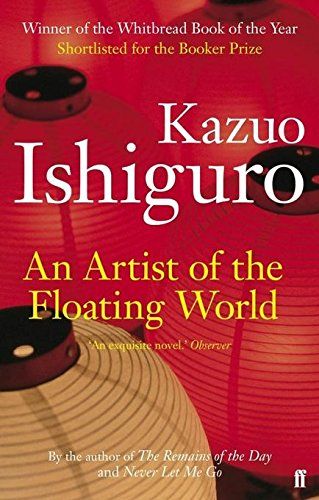Significance of the Set book, An Artist of the Floating World
By Wornicks Gisemba
This is a story about art and its significance to an individual and society. Masuji Ono, the main protagonist and sole narrator, describes his life events in reminiscent anecdotes through which the reader ponders on the life of an artist – challenges, victories and triumphs; betrayals and disappointments; personal faults and regrets, etc.
First is a question on the justifiability of a parent forcing their child into a career which is antagonistic to the child’s ambitions. The formative stage of Masuji’s painting career is monumentally turbulent. His father is vehemently against him taking painting as a career. The father cites the prophecy of a priest who visited when Masuji was born, warning that although Masuji was born with healthy limbs, he had a natural flaw and weakness which would give him a tendency towards slothfulness and deceit. The priest urged the parents to be vigilant and check the weak streak whenever it tried to manifest itself, lest Masuji grow up to be a good-for nothing. The father hence beseeches Masuji to abandon his ambition and instead become an accountant (like himself) because artists “live in squalor and poverty”. The father carbonises Masuji’s paintings to impel him to abandon his aspirations, but Masuji says that burning of his paintings only kindled his ambition.
Secondly, we see the struggles to breakthrough in a career. Masuji moves to Furukawa, a half-day’s train journey from Tsuruoka, his native village. He joins Takeda firm, owned by Master Takeda, a teacher of art and entrepreneur. Master Takeda urges his protégés to endeavour and produce many paintings within short notice lest they quickly lose future commissions to rival firms. Masuji narrates how arduous and daunting the assignments were, as he would work long hours, deep into the night, sleeping barely three hours. With his fellow painters, Masuji would go day to day dizzy with exhaustion. The commission earned would help him pay rent for his residence, an attic room without electricity, located in a dilapidated neighbourhood. Nonetheless, Masuji significantly outshines his fellow protégés, gaining monumental reputation from them such as Yasunari Nakahara (nicknamed “the Tortoise” due to his slow painting pace).
As he develops in his career, Masuji attracts the interest of a more established teacher, Seiji Moriyama (Morisan), thus recruiting him. Morisan’s protégés stayed at his villa, therefore Masuji didn’t worry about rent. However, Morisan insisted to his protégés to base their paintings exclusively on “the floating world”- pleasure and aesthetics at the pleasure district where they often drank, in the company of “geishas” (mistresses and hostesses). Anyone who dared contravene this philosophy would have his paintings confiscated and immediately expelled. At the villa, imbibing was revered, and Masuji was deep into it. Drinking and partying would continue straight through one night, through the following day and into a second night. Such nights preceded terrible exhaustion. Contrastingly, exhaustion at Takeda firm would be due to busy work throughout the night, but at Morisan’s villa the exhaustion emanated from all-night alcohol indulgence.
At the peak of his career, Masuji meets Chishu Matsuda, a warmonger and government propagandist who convinces him to begin creating imperialistic art in fortification of the Japanese military conquest. Masuji abandons Morisan’s philosophy and embarks on imperialistic painting. Two such paintings were named “Complacency” and “Eyes to the Horizon”. The latter depicted soldiers brandishing bayoneted rifles marching to attack and conquer other nations. The paintings earned Masuji national acclaim, helping him acquire a magnificent house. Tragically, America bombs Japan, forcing Japan to surrender. The bombing affects Masuji monumentally as he loses his wife and son. The aforementioned house is also damaged. After the surrender, proponents of the war are castigated as some commit suicide as atonement. Due to irrelevance and utter condemnation, Masuji retires from painting.
At this point, Masuji becomes a victim of his own talent. He is taken aback by the roller-coaster turn of events. His daughters and close relatives condemn him for having been a pro-war painter. His grandson, Ichiro, is inspired by American heroes and movie stars and contemptuous of Japanese heroes whom he (Masuji) wants the grandson to emulate. Young Japanese embrace Americans for helping rebuild their country. Marriage negotiations for his spinster daughter, Noriko, collapse when the prospective suitor withdraws on discovering that Masuji supported the war which caused their country untold suffering. Heart-stricken by the incessant condemnations, Masuji begins self- justification, saying that he chose imperialistic painting because it was the best thing to do: as a patriot, it was his responsibility to support the endeavours of his country during the war.
It is necessary that learners choose this book which is in the optional set book category because it enhances understanding of foreign culture as well as appreciation of the proper utilisation of their skills and talents for personal good as well as community service.
About the writer:
Wornicks Gisemba is a teacher of English at Nkoile Boys High School, Kajiado Central. He is also an author, editor and examiner. wornicksg@gmail.com



Hi, this is a comment.
To get started with moderating, editing, and deleting comments, please visit the Comments screen in the dashboard.
Commenter avatars come from Gravatar.